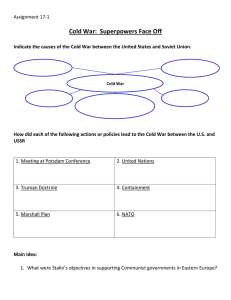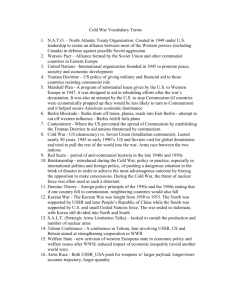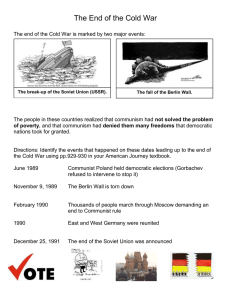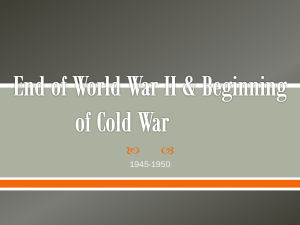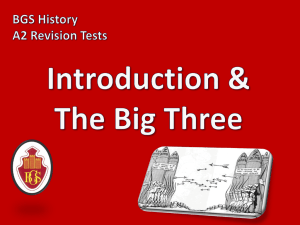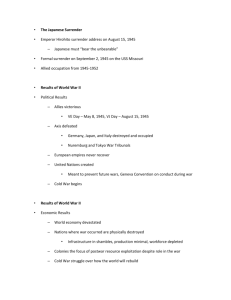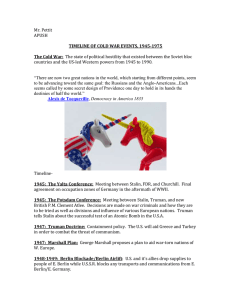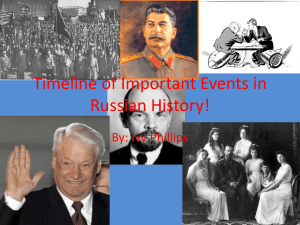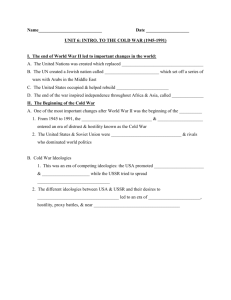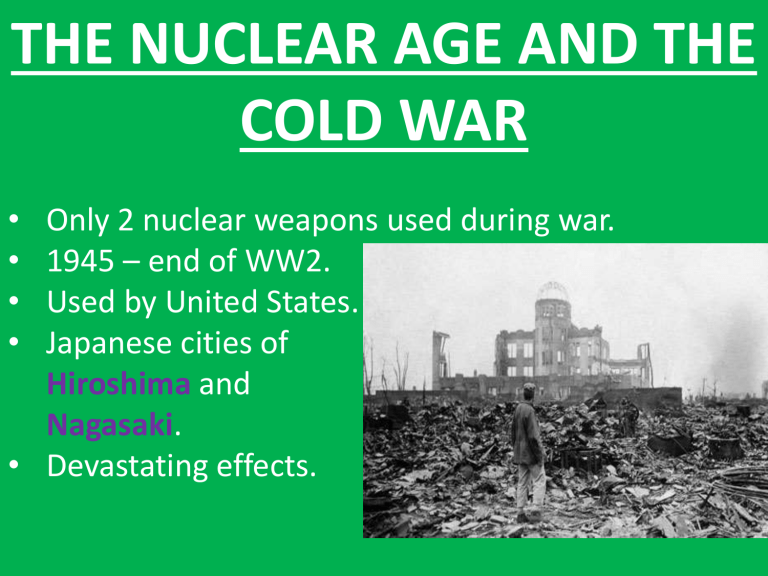
THE NUCLEAR AGE AND THE COLD WAR • • • • Only 2 nuclear weapons used during war. 1945 – end of WW2. Used by United States. Japanese cities of Hiroshima and Nagasaki. • Devastating effects. 1.INCREASING TENSION BETWEEN THE ALLIES AFTER WW2. 1.1. YALTA CONFERENCE FEBRUARY 1945 • Allies divided Germany and Berlin into 4 zones. • Allied Leaders: USA - Roosevelt Britain - Churchill Russia - Stalin 1.2. POTSDAM CONFERENCE 17 JULY – 2 AUGUST 1945 • Decide how to administer punishment to Germany. • Increased tension between Allies. • Allied leaders: USA - Truman Britain - Churchill then Attlee Russia - Stalin 1.3. EVENTS THAT AFFECTED ALLIED RELATIONS 1.). R occupied Central and Eastern Europe. Russian troops did not withdraw. Stalin insisted it was a defensive measure. 2.). Churchill was defeated in B’s general election. Attlee was B Prime Minister. He distrusted Stalin. 3.). Roosevelt died before the end of WWII. Vice-President Truman became President. Truman was suspicious of Stalin. Allied unity collapsed. 4.). 16 July 1945 - US tested atomic bomb in Mexico. Churchill and Truman agreed to use bomb to defeat Japan. 5.). KGB spies already knew about the bomb. Potsdam Declaration – threatened Japan with total destruction in they did not surrender. 1.4. THE USSR (COMMUNISM) VS. USA AND THE WEST (CAPITALISM). 1.4.1. USSR AND COMMUNISM. • • • • • • • • • 1917 – Russian Revolution. Tsar Nicholas II overthrown. Communist government took over. Renamed Union of Soviet Socialist Republics (USSR) Lenin – leader of communist party. Peace, land and bread! 1917 – Withdrew from WWI. 1924 – Stalin took over after Lenin’s death. Ruthless dictator, extreme violence. • • • • Created a mighty military industrial world power. Led Soviet into WWII. 1917-1991 – 15 Soviet Socialist Republics. Capital city was Moscow. 1.4.2. COMMUNIST IDEALOGY. • • • • • Beliefs: Few rich people shouldn’t control country’s wealth. Govt should rule in the interest of all, not just rich. Wealth shared equally. Economy is centrally planned. No one can own private property or make a profit. State owns large industries and other wealth. Communist govts not usually democratic. Ideas developed by Karl Marx, Lenin and Trotsky. Violent overthrow of capitalism. Ideology popular among poor all over the world. Threat to W.E. – tried to stamp it out. 1.4.3. USA AND THE WEST, AND CAPITALISM. • • • • • USA – Capitalist country. Became a powerful nation during WWI. Capital city – Washington D.C. ‘West’ – countries allied to the US ‘West’ – capitalist democratic countries In Western Europe, including Britain. 1.4.4. CAPITALIST IDEOLOGY. • • • • Beliefs: Some people rich, some poor. Making a profit motivates people. Individuals own private property. Govt does not control economy. Not always democratic. Harry Truman – led US. Opposed Soviet control over other countries. He wanted US to: - resist communism. - limit Soviet expansion. 2. END OF WWII: ATOMIC BOMB & BEGINNING OF NUCLEAR AGE 2.1. HOW WWII CAME TO AN END 2.1.1. ALBERT EINSTEIN’S IDEAS • • • • • • • Grew up in Germany. Developed scientific ideas. 1921 – awarded Nobel Prize in Physics. Not involved in making of nuclear bombs. His theories used to develop it. Jew – left Europe to escape Nazis – went to US. Encouraged US to develop atomic bombs to stop Germany. 2.1.2. THE MANHATTAN PROJECT • • • • • • 1939 – Manhattan project. US govt – research and produce atomic bomb. ‘The Gadget’. 16 July 1945 – exploded in desert in New Mexico. Turned sand into glass (heat). Leader of Manhattan Project–Robert Oppenheimer - relieved at success. - realised deadly destructive power. 2.1.3. END OF WWII & START OF NUCLEAR AGE • May 1945 - Germany & Italy defeated. - Japan still fighting. • 6 August – bombed Hiroshima – 90 000 died. • 9 August – bombed Nagasaki – 60 000 died. • Both cities produced weapons of war for Japan. • 14 August – Japan defeated – end of WWII. • Start of Nuclear or Atomic Age. • Threat of devastating nuclear weapons. • Einstein : - concerned about humanity and world peace. - tried to persuade world leader to give up nuclear weapons AVOID FURTHER CASUALTIES - Invasion of Japan -cause casualties - War against China JAPAN SURRENDER - Force Japan to surrender. - Instil fear. 2.2. WHY DID USA DROP BOMBS? - USSR Intimidate USSR. Military superiority. Stop USSR invading Japan. Did not want to share victory with USSR. YES 2.3. WAS IT JUSTIFIED? NO 3. SUPERPOWERS & COLD WAR • • • • • • • • • • 1941 – Hitler invaded Russia. Joined Allies in war against Axis powers. Capitalist USA and Communist Russia same side. Same enemies – Germany, Italy and Japan. After WWII – rivals. 1949 – Russia developed nuclear weapons. R and USA wanted to spread their power. Too dangerous and destructive for ‘hot war’. Cold War – not fought on battlefield. R and USA – Superpowers. 4. AREAS OF CONFLICT BETWEEN SUPERPOWERS 4.1. ARMS RACE • US and USSR competed to build most nuclear weapons. • Mutual Assured Destruction (MAD). • If one side attacked, the other would respond. 4.2. THE ARMS RACE AND THE THREAT OF NUCLEAR WAR OVER CUBA • 1960s - superpowers wanted control of Cuba. • Cold War almost became a hot war. • Cuba: - Island off Florida (US). - Capitalist, oppressive, corrupt government. - Ruled by General Batista. - Close economic ties with US. - Playground for rich from US. - Ordinary Cubans very poor. - Few human rights. • • • • • - Unhappy with Batista. 1959 – revolutionaries toppled Batista regime. Led by Fidel Castro and Che Guevara. Castro implemented social reforms: 1. Land distribution from rich to poor. 2. Nationalisation of American-owned businesses. US President – Kennedy. Concerned about Castro’s socialist programme. 4.2.1. THE BAY OF PIGS INVASION • • • • • • • • • US govt tried to overthrow Cuban govt. Invaded Bay of Pigs. Americans defeated. US humiliated. Castro looked to R for help. R leader – Khrushchev. Economic aid and weapons to Cuba. Hostile state on US doorstep. Backed by R. 4.2.2. THE CUBAN MISSILE CRISIS • • • • • • • • • • World came close to nuclear war. Castro feared another attack. Khrushchev wanted US in range of fire. US had missiles close to USSR. Wanted to reduce risk of attack on R. 1962 – USSR started to build missiles in Cuba. Very secretive and quickly. US navy ships blockaded seas around Cuba. Kennedy demanded USSR remove missile bases. Tense negotiations – agreed: - Krushchev - remove missiles. - Kennedy – guaranteed US would not attack Cuba. Peaceful competition. Compete in space exploration Peaceful competition. Compete in space exploration 1957 – first satellite in space US fearful had to catch up Rockets carry nuclear bombs. Rockets carry nuclear bombs USSR US 1957 – R sent Laika into space. US - goal Man - moon Publicised R - secret Successes - public 1961 -R Yuri Gagarin First man in space. 1969 - US - moon Armstrong, Aldrin & Collins. National pride. Won race. NB for humankind. 4.3. DIVISION OF GERMANY AND BERLIN WALL. 4.3.1. DIVISION OF GERMANY 1946 • Allies won WWII in 1945. • B, F + US zones = West Germany. • R zone = East Germany = Communist rule • 1946-1961 – 3 million emigrated from E.G. to W.G. • Humiliated R. • Damaged East German economy. 4.3.2. DIVISION OF THE CITY OF BERLIN 1946 • Berlin situated in the East. • Divided West Berlin - Allies East Berlin - Soviet • People could move between East and West Berlin: Movies and theatres. Work. 200 000 E. Berlin visited W. Berlin every day. 4.3.3. THE BERLIN WALL 1961 • • • • • • • August 1961 – R blocked off E.B from W.B. Solid wall. People from E.B. could not go to W.B. US and R tanks faced each other. Threat of real war. Wall heavily guarded. People killed and wounded trying to cross wall. 5.THE END OF THE COLD WAR,1989 5.1. THE FALL OF THE BERLIN WALL, 1989 • 1985–Mikhail Gorbachev leader of R. • R economy was inefficient. • Gorbachev – new reforms: perestroika – restructuring of R economy. glasnot – policy of openness. • New freedoms, e.g. freedom of speech. • Mass demonstrations against C govt in E. Europe. • 1989 – Erich Honecker resigned (head of E. G.) • Travel restrictions for E. Germans lifted. • • • • • • Border guards forced to let crowds through. Celebrations. Wall remained guarded. E. G. tried to repair wall. 1990 – Unification of Germany. Wall completely destroyed. 5.2. THE FALL OF THE SOVIET UNION 1991 • From end of WWII, world politics was dominated by superpowers, US and R. • December 1989, Gorbachev and George W. Bush declared Cold War officially over. • Gorbachev hoped to save communist system in R. • Failed. • 1991 - Soviet Union dissolved. - Communist government came to an end.
